Healthiest and sugar should not be two words used in the same sentence! But, I like a little something sweet from time to time, and want to choose something that is going to be a healthier option for me. I have made a little list of my top 5 healthiest sugars. I get questions about these all the time, and am excited to help you feel better about a little sweet indulgence. 😉
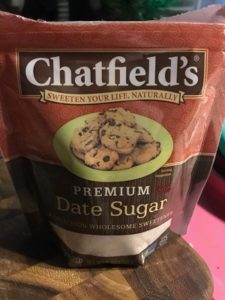 Top 5 Healthiest Sugars
Top 5 Healthiest Sugars
- Date Sugar: This is my favorite choice. Date sugar is just dates that have been pulverized into a dry powdery sugar. Date sugar still contains fiber and vitamins and minerals. It is also less sweet than other sugar sources: about 2.7 g sugar for date sugar instead of 5 g sugar for table sugar. Date sugar can be expensive for a sugar source, but I suppose the point is not to use too much! Can be found on Amazon here or at health food stores.
- Organic, Pesticide-free Honey. Not all honey is created equally. About 75% or more of the honey we consume is loaded with
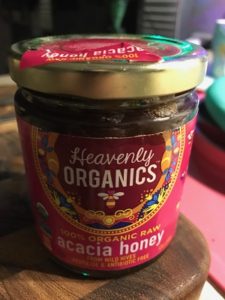 pesticides!! Yikes. Pesticides can disrupt hormone function. My go-to honey is an organic one from Heavenly Organics. I also like the Wholesome Sweetener’s honey. Both are pesticide free and you can find at many local grocery stores. You have to double check and do a little research to make sure it is pesticide free. Honey contains antibacterial properties, antioxidants, and perhaps some immune boosting properties which is why I rank it number two!
pesticides!! Yikes. Pesticides can disrupt hormone function. My go-to honey is an organic one from Heavenly Organics. I also like the Wholesome Sweetener’s honey. Both are pesticide free and you can find at many local grocery stores. You have to double check and do a little research to make sure it is pesticide free. Honey contains antibacterial properties, antioxidants, and perhaps some immune boosting properties which is why I rank it number two! 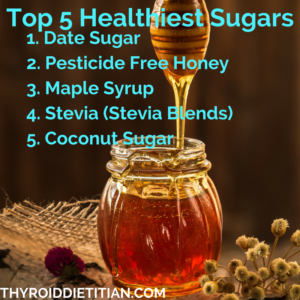 Maple Syrup: this is one of my favorite tasting sweeteners. It makes my list for its higher vitamin and mineral content like zinc and manganese. I prefer to choose organic maple syrup as well to help reduce pesticide exposure once again.
Maple Syrup: this is one of my favorite tasting sweeteners. It makes my list for its higher vitamin and mineral content like zinc and manganese. I prefer to choose organic maple syrup as well to help reduce pesticide exposure once again.- Stevia: OK, so this is not really sugar. But, stevia is a natural sweetener and often used to take the place of sugar. Stevia is not an artificial sweetener, and does not promote the growth of bad bacteria in the intestinal tract like artificial sweeteners do. The main thing you want to watch for here is additives in the brand of stevia you buy. Check first to make sure it is labeled gluten free (most are). Next, check the ingredient list to see what else may be blended with the stevia (often done to reduce bitterness). Avoid anything you don’t know the name of as a good general rule of thumb. You will often see dextrose added. Dextrose is most commonly corn which is fine, but I prefer it organic. I tend to buy store brand stevia and organic when I can. The best thing about stevia is that there are no grams of sugar involved!! I love adding it to smoothies when needed, “mug cakes”, recipes to reduce sugar, and sweet potatoes when I want them sweet.
- Coconut Sugar: First, don’t believe all the hype you may read about coconut sugar. It is STILL sugar. However, coconut sugar has a slightly lower glycemic index, and slightly less fructose than table sugar. And, it is natural! All this means is that coconut sugar will absorb a little bit more slowly and be a tad bit healthier. I would not go around loading up on this sweetener. But, it can be a nice, more natural option for dessert recipes.
If you would like to know even more about any of these sweeteners, let me know and I can do a whole blog post about one individual one. This post is just to give a quick run-through to help you select something healthier!


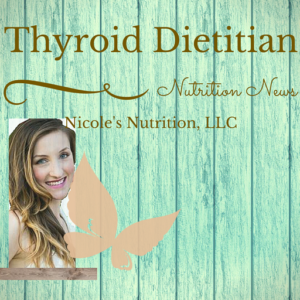
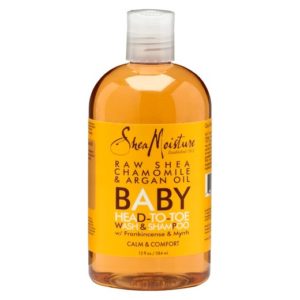
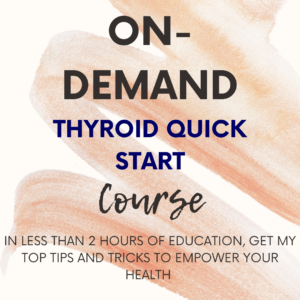
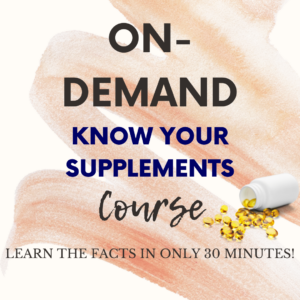
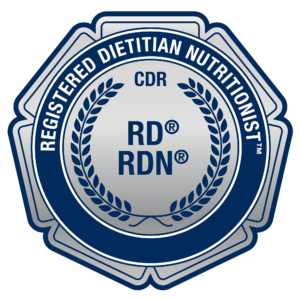
I have a protein powder that is sweetened with monk fruit. I have Hashimoto’s- is this ok? I don’t use any other sweeteners except honey and maple syrup normally.
I also like monk fruit as a natural no sugar option as it does not negatively affect intestinal health as far as we know.